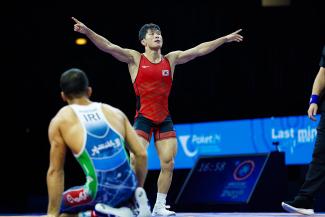ZAGREB, Croatia (September 20) -- Hanjae CHUNG (KOR) has long been the training partner of former world champion Hansyu RYU (KOR) at national camps in Korea as both hail from Busan and wrestled at the Kyungsung University.
Eight years after Ryu became a world champion in Paris, Korea's last gold at World Championships, Chung would try to emulate his role model after he made the 63kg final at the World Championships in Zagreb on Saturday.
In his previous two trips to the World Championships, Chung finished eight and 25th but has now assured himself at least a silver medal in 2025. This is also Korea's first medal since Min Seok KIM (KOR) won bronze in 2018.
Chung opened his campaign with a 7-1 victory over Ivan LIZATOVIC (CRO) before picking up a fall over Manato NAKAMURA (JPN). Tokyo bronze medalist Sergey EMELIN (UWW) was next but Chung defended from par terre and posted a 1-1 criteria win.
In the semifinals, Chung had Asian silver medalist Mohammad KESHTKAR (IRI) but he stepped up. Keshtkar got the first par terre position but was not able to score any points, going to the break leading 1-0.
The second period saw Chung go for the reverse throw for two points and Keshtkar was docked two points for a leg foul, giving a 5-1 lead to Chung. Keshtkar tried making a comeback and got a takedown to cut the lead to 5-3 but that was all he had as Chung claimed the victory in the semifinals.
But to win his country's first gold since 2017, Chung will have to go through Aytjan KHALMAKHANOV (UZB) who looks unbeatable. A month after winning the gold medal at the U20 World Championships, the Uzbek star is now in the World Championships final with a dominant 8-0 win over Vitalie ERIOMENCO (MDA).
Khalmakhanov needed only 37 seconds to finish his semifinals against Erimenco as he used an over-under grip to slam him on the mat for two points. He continued the same sequence for two more points and lead 6-0. A trap arm gut was enough to get him two more points and the win.
Iran managed two more wrestlers in the final at the World Championships with Olympic champion Saeid ESMAEILI (IRI) and Olympic silver medalist Alireza MOHAMADI (IRI) a win away from winning their first world titles at 67kg and 87kg respectively.
Esmaeili particularly looked in the form of his life as he blanked his 36-0 in four bouts with none going the full distance of the six minutes. He began with a 9-0 win over 2022 world champion Sebastian NAD (SRB) before two 8-0 wins against Shermukhammad SHARIBJANOV (UZB) and Haavard JOERGENSEN (NOR), 8-0.
In the semifinals, he used a five-point throw to beat Daniial AGAEV (UWW). Using a bodylock, he scored his first takedown and then turned Agaev for a 4-0 lead. He then got the par terre position and reverse lifted Agaev and slammed him for five points.
For the gold medal, he will have to get past Olympic bronze medalist Hasrat JARAFOV (AZE), a returning silver medalist. Jafarov faced Razzak BEISHEKEEV (KGZ) in the semifinal and used a correct throw from par terre to beat the Kyrgyzstan wrestlers 3-1.
Mohamadi had a very contrasting semifinal against David LOSONCZI (HUN) at 87kg. He seemed to be sailing to victory with 5-1 lead and under a minute left but Losonczi locked his waist and threw him for a takedown for two points. Hungary challenged the call asking for four points but it was awarded only two on review and Hungary lost the challenge to give one more point to Mohamadi.
With a 6-3 win, Mohamadi, a silver medalist at 82kg from 2023, will now try to win the gold medal against former European champion Aleksandr KOMAROV (SRB).
Trusting his defense in the semifinal against Milad ALIRZAEV (UWW), Komarov held on to his 1-1 criteria lead to win the bout. Komarov was the beneficiary of the new Greco-Roman rule which states that the criteria will remain with the wrestler who got the first point in a 1-1 finish.
Irrespective of what happens in the final on Sunday, Iran has already won the Greco-Roman team title. This is the first time in the country's history that Iran has won both Freestyle and Greco-Roman team title at the same World Championships.
RESULTS
63kg
GOLD: Hanjae CHUNG (KOR) vs. Aytjan KHALMAKHANOV (UZB)
SF 1: Hanjae CHUNG (KOR) df. Mohammad KESHTKAR (IRI), 5-3
SF 2: Aytjan KHALMAKHANOV (UZB) df. Vitalie ERIOMENCO (MDA), 8-0
67kg
GOLD: Saeid ESMAEILI (IRI) vs. Hasrat JAFAROV (AZE)
SF 1: Saeid ESMAEILI (IRI) df. Daniial AGAEV (UWW), 10-0
SF 2: Hasrat JAFAROV (AZE) df. Razzak BEISHEKEEV (KGZ), 3-1
87kg
GOLD: Alireza MOHMADI (IRI) vs. Aleksandr KOMAROV (SRB)
SF 1: Alireza MOHMADI (IRI) df. David LOSONCZI (HUN), 6-3
SF 2: Aleksandr KOMAROV (SRB) df. Milad ALIRZAEV (UWW), 1-1



Share your thoughts.
Comments